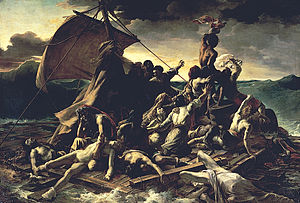 |
| Théodore Géricault's Raft of the Medusa, circa 1820 |
In the twentieth century, Pablo Picasso's Guernica (1937) used arresting cubist techniques and stark monochromatic oils, to depict the harrowing consequences of a contemporary bombing of a small, ancient Basque town. Leon Golub's Interrogation III (1981), depicts a female nude, hooded detainee strapped to a chair, her legs open to reveal her sexual organs, surrounded by two tormentors dressed in everyday clothing. Andres Serrano's Piss Christ (1989) is a photograph of a crucifix, sacred to the Christian religion and representing Christ's sacrifice and final suffering, submerged in a glass of the artist's own urine. The resulting uproar led to comments in the United States Senate about public funding of the arts.
From Wikipedia, the free encyclopedia
